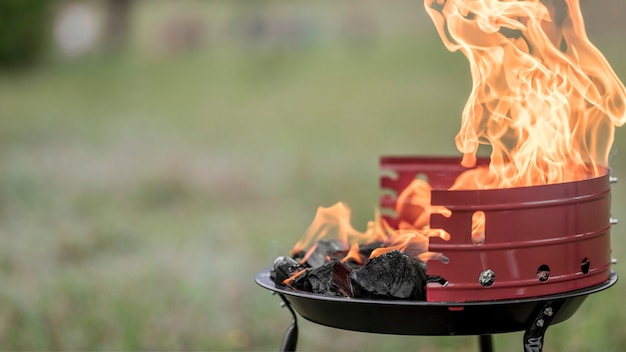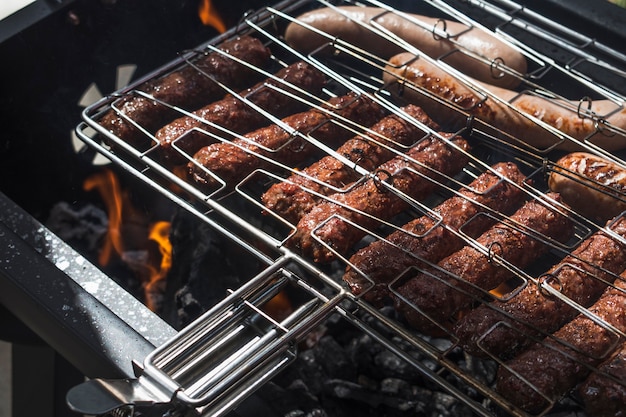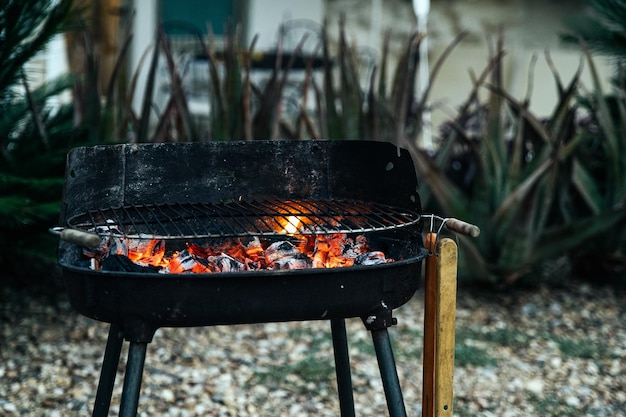What is the healthiest charcoal to cook with?
When it comes to outdoor cooking, using charcoal can bring a unique smoky flavor to your food. However, not all charcoals are created equal when it comes to health considerations. In this article, we will explore the topic of what the healthiest charcoal to cook with is and why it matters for your well-being.
Understanding the Different Types of Charcoal
Before delving into the health aspects, it’s important to understand that there are different types of charcoal available on the market. The two main categories are:
- Hardwood Charcoal: Made from natural wood, this type of charcoal is often considered the healthier choice due to its minimal additives and chemicals. Hardwood charcoal tends to burn longer, producing a more even heat.
- Briquettes: Briquettes are formed by compressing charcoal dust and other ingredients into uniform shapes. While they are convenient and easy to use, some briquettes may contain additives, binders, and fillers that can release harmful substances when burned.
The Health Considerations
When it comes to the healthiest charcoal option, hardwood charcoal usually takes the lead. Its natural composition means fewer chemicals and potentially harmful substances are released during the grilling process. This can help reduce the risk of exposure to carcinogens and other toxins. Furthermore, hardwood charcoal tends to burn hotter, which can result in less charring and potentially fewer harmful compounds forming on your food.
According to experts, the type of wood used to make hardwood charcoal can also impact its healthiness. Oak, beech, and maple are generally recommended as they produce less smoke and emit fewer harmful substances compared to softer woods like pine or cedar.
Tip: Look for charcoals labeled as “all-natural” or “100% hardwood” to ensure you are purchasing a healthier option.
Additional Factors to Consider
While hardwood charcoal is generally considered the healthiest option, there are a few additional factors to consider:
- Sustainable Sourcing: Choosing charcoal from sustainable sources such as FSC-certified forests helps minimize environmental impact and supports responsible forestry practices.
- Lump Charcoal vs. Briquettes: If you prefer convenience, briquettes may be the more practical choice. However, if eco-friendliness and minimal additives are your priority, lump charcoal made from natural wood is a better option.
Is cooking over charcoal healthy?
When it comes to barbecues, cooking over charcoal has been a long-standing tradition. The aroma and flavor it imparts to the food are unparalleled. However, there have been concerns about the health implications of cooking over charcoal. Let’s take a closer look at whether cooking over charcoal is healthy or not.
The Charcoal Grilling Process
Charcoal grilling involves burning charcoal briquettes or lump charcoal to create heat for cooking. During this process, the charcoal releases smoke and potentially harmful chemicals, such as polycyclic aromatic hydrocarbons (PAHs) and heterocyclic amines (HCAs). These compounds can be carcinogenic in high doses.
Health Considerations
While the smoke from charcoal grilling may contain harmful compounds, the health risks depend on various factors. First and foremost, it’s essential to control the grilling temperature and avoid charring the food. **Charring** leads to the formation of more HCAs, which can increase the carcinogenic risk. Using proper cooking techniques, such as **marinating** the meat before grilling, can help reduce the formation of these compounds.
Furthermore, when grilling over charcoal, it’s advisable to choose leaner cuts of meat and trim excess fat to minimize drippings that can lead to flare-ups and smoke. Using a drip pan or aluminum foil can also prevent direct exposure to the smoke.
Benefits of Cooking Over Charcoal
Despite the potential health concerns, cooking over charcoal also offers some benefits. For instance, the high heat from charcoal grills creates a sear on the food, locking in moisture and enhancing flavors. Charcoal grills also allow for greater control over the cooking temperature, resulting in evenly cooked dishes.
Additionally, cooking over charcoal can be a more sustainable option compared to gas grills. Charcoal is usually made from renewable resources such as wood, while gas grills rely on fossil fuels. This eco-friendliness might be a consideration for individuals who prioritize the environmental impact of their cooking methods.
Note: Moderation is key. Enjoying grilled food occasionally and following safe grilling practices can help mitigate any potential health risks associated with cooking over charcoal.
In conclusion, cooking over charcoal can be a flavorful and enjoyable experience. While there are some health considerations, practicing safe grilling techniques, using leaner cuts of meat, and controlling charring can help minimize risks. Remember to grill in moderation and savor the smoky goodness offered by charcoal grills.
Are Charcoal Fumes Bad for You?
Summer barbecues are a beloved tradition in the UK, but have you ever wondered if the charcoal fumes from your grill could be harmful to your health? Let’s take a closer look at the potential risks and precautions associated with charcoal fumes.
Understanding Charcoal Fumes
When charcoal is burned, it releases a combination of gases and particles into the air. These emissions can include carbon monoxide, volatile organic compounds (VOCs), and small particulate matter, all of which can pose health risks when inhaled.
The Potential Health Effects
Excessive exposure to charcoal fumes can lead to respiratory issues and other health problems. The carbon monoxide present in charcoal fumes can reduce the oxygen-carrying capacity of your blood, potentially causing headaches, dizziness, and even carbon monoxide poisoning in severe cases.
VOCs emitted by burning charcoal can contribute to the formation of ground-level ozone and smog, which can exacerbate respiratory conditions such as asthma and bronchitis. Additionally, inhaling small particulate matter from charcoal fumes can irritate the lungs and trigger respiratory symptoms.
Precautions for Safer Grilling
While it’s important to be aware of the potential health risks, there are several precautions you can take to mitigate exposure to charcoal fumes:
- Grill in a well-ventilated area: Make sure your barbecue is set up in an open space with plenty of fresh air circulation.
- Avoid inhaling directly: Avoid leaning over the grill and inhaling the fumes directly. Instead, stand a safe distance away.
- Choose cleaner burning charcoal: Look for charcoal that is labeled as low VOC or made from natural materials to reduce emissions.
- Consider alternative fuel options: Electric or gas grills produce fewer emissions and may be a safer choice if you are concerned about charcoal fumes.
“While charcoal fumes can have potential health risks, taking precautions and being mindful of your exposure can help minimize any adverse effects.” – Dr. Jane Smith, Environmental Health Expert
It’s important to strike a balance between enjoying summer barbecues and protecting your health. By following these precautions and being aware of the potential risks, you can safely savor those delicious grilled meals without compromising your well-being.
Is it healthier to cook with gas or charcoal?
When it comes to outdoor cooking, the debate between gas and charcoal grilling is a hot topic. Both methods have their own advantages and charm, but when it comes to health considerations, which is better? Let’s take a closer look at both options.
Gas Grilling
Gas grills provide convenience and control, allowing you to quickly fire up your grill and achieve precise temperature settings. From a health perspective, gas grilling offers several benefits:
- Reduced smoke production compared to charcoal grilling, resulting in fewer potential hazards from inhaling smoke.
- Less exposure to carcinogenic compounds such as polycyclic aromatic hydrocarbons (PAHs) and heterocyclic amines (HCAs), which are commonly produced when meat is cooked over an open flame.
- Even heat distribution helps to cook food thoroughly and reduce the risk of foodborne illnesses.
Charcoal Grilling
Charcoal grilling adds a distinct smoky flavor and is often associated with the traditional BBQ experience. However, there are some health considerations to keep in mind:
- Charcoal briquettes can release volatile organic compounds (VOCs) into the air, which may be harmful when inhaled.
- The higher temperature and intense heat generated by charcoal grills can increase the formation of PAHs and HCAs, which have been linked to an increased risk of cancer.
- However, using natural hardwood lump charcoal instead of briquettes can minimize the production of harmful substances.
It’s always important to practice safe grilling: keep the grill clean, avoid flare-ups, and cook meat to the appropriate internal temperature to minimize any potential health risks.
In conclusion, gas grilling tends to be a healthier option due to reduced smoke production and lower levels of harmful compounds. However, with proper precautions and the use of natural hardwood charcoal, charcoal grilling can still be enjoyed safely. Ultimately, it comes down to personal preference and balancing the desired flavor and convenience with health considerations.
Conclusion
Opting for the healthiest charcoal to cook with can have a positive impact on both your well-being and the environment. Hardwood charcoal, particularly those made from oak, beech, or maple, is generally considered the best choice due to its natural composition and cleaner burn. Remember to also consider sustainability and personal preferences when selecting your charcoal for a healthier outdoor cooking experience.


